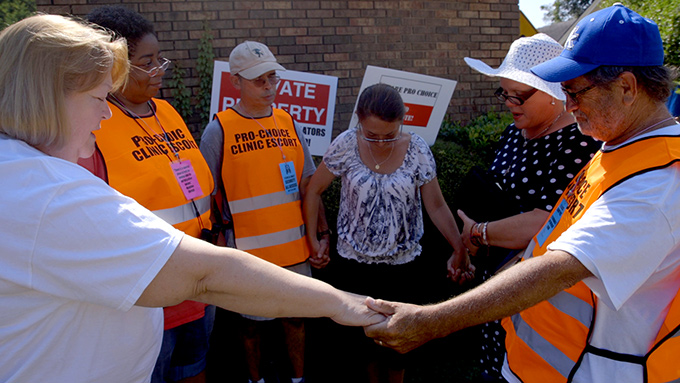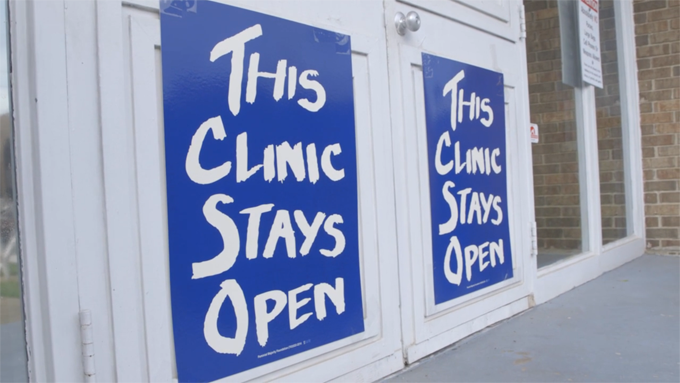
The greatest threat to abortion providers in the United States is not fanatics like Robert Lewis Dear, who killed innocent people at a Colorado Planned Parenthood clinic – it’s state legislatures, many of which are going back into session this week.
In theory, Roe v Wade guarantees a woman a choice about whether to have an abortion. But the reality is more complicated. New laws are cropping up in state legislatures around the country – laws that appear to be mundane regulations but that are in fact aimed at closing abortion clinics at alarming rates.
These targeted regulations of abortion providers, or TRAP laws, don’t make abortion itself illegal but impose more and more regulations on providers, dictating everything from the width of clinic hallways to how and when doctors can administer medications like the abortion pill. Ultimately legislators are using these regulations to make an end run around a constitutional right. And increasingly, when women choose to exercise that right, they are finding that there’s nowhere to go.
The regulations that have been most devastating to abortion clinics are those that impose standards that are expensive or impossible to meet, leaving the doctor and the clinic in a Kafkaesque catch-22.
Since 2010, when the midterm elections filled state and local governments with Tea Party activists and other conservatives, there have been more than 250 restrictions on abortion passed in states across the country. In making the film Trapped, I’ve seen how these laws restrict women’s options, often with devastating results.
I saw how, in states like Mississippi, where just one clinic is open, there are long waiting periods for women who need to see a physician. This is also true in states like Alabama, where a handful of doctors work at the few remaining clinics.
Required waiting periods of 24 to 72 hours mean that women who have already traveled for perhaps hundreds of miles have to either make two round trips or take time off from work and family responsibilities if they want to have an abortion.
These laws are literally sweeping the country. There are now 27 states categorized by the Guttmacher Institute, a thinktank dedicated to reproductive health issues, as hostile to abortion, 18 of them extremely hostile – meaning that they have more than six major types of abortion regulations on the books.
The regulations that have been most devastating to abortion clinics are those that impose standards that are expensive or impossible to meet, such as the requirement that a doctor working in an abortion clinic have admitting privileges at a local hospital. We saw that often local hospitals won’t grant these privileges, leaving the doctor and the clinic in a Kafkaesque catch-22 in which there is no way to meet the requirements of the law. And patients seeking an abortion find themselves unable to access the care they seek.
Many of the laws being introduced over and over again around the country are nearly identical. A conservative anti-abortion group, Americans United for Life (AUL), writes model laws and circulates them to legislators in different states. AUL boasts that a third of the 220 state laws restricting abortion that were passed between 2011 and 2014 are based on its “model legislation” or were drafted with assistance from AUL attorneys. When a regulation sticks in one state, the group sends it along to another state, and the spiral continues.
Challenges to these laws have been slowly percolating through the courts, but this spring they will come to the forefront of the American political dialogue. In March the supreme court will hear a case challenging Texas’s HB2 law, which is in many respects the model for TRAP regulations. The Texas case is being watched closely – and the stakes are very high.
The idea that in this day and age American women would contemplate having to self-abort is shocking.
The case has been described as the most important reproductive rights case to come before the court in the past two decades, one that could literally determine whether the protections set forth in Roe v Wade remain the law of the land.
While the intrusions into the democratic process are frightening, there is an additional sobering reality. With the spread of these laws, we are starting to see a world without abortion clinics. And that is a real threat to women’s health.
One study estimates that between 100,000 and 240,000 Texas women have tried to self-abort, and researchers suggest that this is partly because of laws that restrict access to abortion, like HB2, which went into effect in 2013. The idea that in this day and age American women would contemplate having to self-abort is shocking.
The rate of major complications after a first-trimester abortion performed in a clinic or hospital is less than 0.25% but proponents of TRAP laws insist that these laws are intended to protect women’s health and safety. I see it differently. These laws interfere with a woman’s constitutionally protected right to make her own decisions about whether and when to bear a child.
This is a threat not only to the right to choose but also to democratic ideals. Rather than engage in the national debate about abortion, lawmakers behind TRAP laws can hide their true intentions.
The truth is that people aren’t going to stop having unplanned pregnancies: according to 2008 data, one in three women in the United States will have an abortion at some time in her life. Some women will choose to carry unplanned pregnancies to term, but others will make the difficult choice to terminate.
If this trend continues, the United States may become the largest industrialized nation in which large swathes of the population don’t have access to safe and legal abortion. If lawmakers really cared about women’s health, they wouldn’t support laws that close clinics but would ensure that women have the right to safe and effective birth control and that they have a safe way to terminate unwanted pregnancies.

This piece, commissioned by Creative Time Reports, has also been published in The Guardian.

